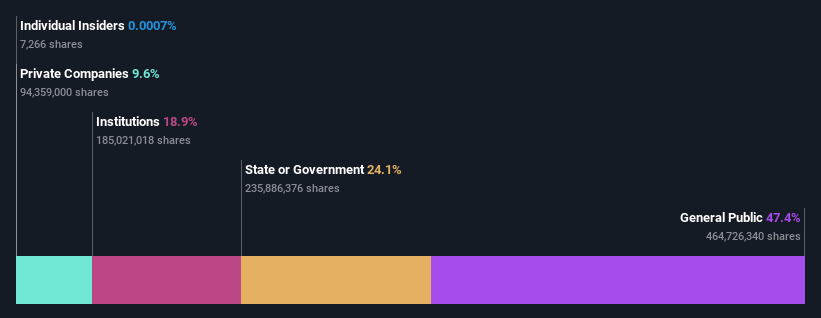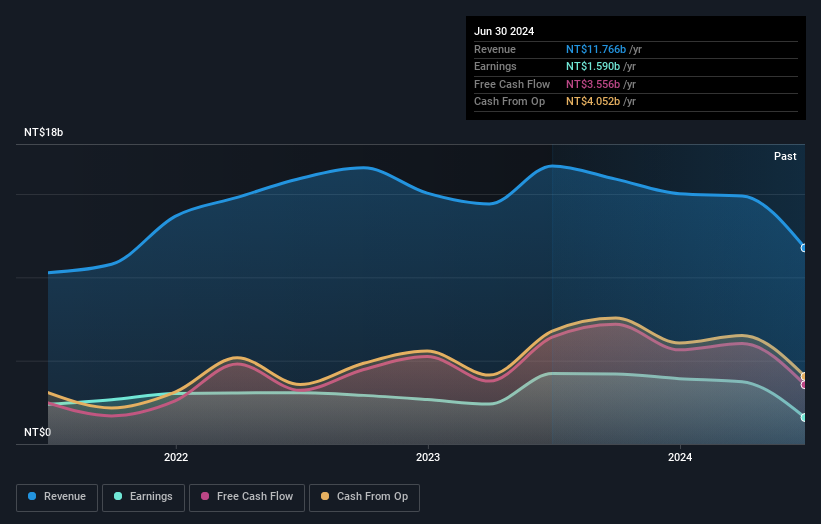Retail investors among Taiwan Fertilizer Co., Ltd.'s (TWSE:1722) largest stockholders and were hit after last week's 3.2% price drop

Key Insights
- Taiwan Fertilizer's significant retail investors ownership suggests that the key decisions are influenced by shareholders from the larger public
- 51% of the business is held by the top 16 shareholders
- Institutions own 19% of Taiwan Fertilizer
To get a sense of who is truly in control of Taiwan Fertilizer Co., Ltd. (TWSE:1722), it is important to understand the ownership structure of the business. With 47% stake, retail investors possess the maximum shares in the company. Put another way, the group faces the maximum upside potential (or downside risk).
As a result, retail investors as a group endured the highest losses last week after market cap fell by NT$1.8b.
Let's take a closer look to see what the different types of shareholders can tell us about Taiwan Fertilizer.
See our latest analysis for Taiwan Fertilizer

What Does The Institutional Ownership Tell Us About Taiwan Fertilizer?
Many institutions measure their performance against an index that approximates the local market. So they usually pay more attention to companies that are included in major indices.
As you can see, institutional investors have a fair amount of stake in Taiwan Fertilizer. This implies the analysts working for those institutions have looked at the stock and they like it. But just like anyone else, they could be wrong. It is not uncommon to see a big share price drop if two large institutional investors try to sell out of a stock at the same time. So it is worth checking the past earnings trajectory of Taiwan Fertilizer, (below). Of course, keep in mind that there are other factors to consider, too.

We note that hedge funds don't have a meaningful investment in Taiwan Fertilizer. The company's largest shareholder is Council of Agriculture Executive Yuan, with ownership of 24%. In comparison, the second and third largest shareholders hold about 4.0% and 3.9% of the stock.
A closer look at our ownership figures suggests that the top 16 shareholders have a combined ownership of 51% implying that no single shareholder has a majority.
Researching institutional ownership is a good way to gauge and filter a stock's expected performance. The same can be achieved by studying analyst sentiments. Our information suggests that there isn't any analyst coverage of the stock, so it is probably little known.
Insider Ownership Of Taiwan Fertilizer
While the precise definition of an insider can be subjective, almost everyone considers board members to be insiders. Company management run the business, but the CEO will answer to the board, even if he or she is a member of it.
Most consider insider ownership a positive because it can indicate the board is well aligned with other shareholders. However, on some occasions too much power is concentrated within this group.
Our data suggests that insiders own under 1% of Taiwan Fertilizer Co., Ltd. in their own names. However, it's possible that insiders might have an indirect interest through a more complex structure. It's a big company, so even a small proportional interest can create alignment between the board and shareholders. In this case insiders own NT$400k worth of shares. Arguably, recent buying and selling is just as important to consider. You can click here to see if insiders have been buying or selling.
General Public Ownership
The general public, who are usually individual investors, hold a 47% stake in Taiwan Fertilizer. While this size of ownership may not be enough to sway a policy decision in their favour, they can still make a collective impact on company policies.
Private Company Ownership
It seems that Private Companies own 9.6%, of the Taiwan Fertilizer stock. It's hard to draw any conclusions from this fact alone, so its worth looking into who owns those private companies. Sometimes insiders or other related parties have an interest in shares in a public company through a separate private company.
Next Steps:
I find it very interesting to look at who exactly owns a company. But to truly gain insight, we need to consider other information, too. Consider risks, for instance. Every company has them, and we've spotted 2 warning signs for Taiwan Fertilizer you should know about.
Of course this may not be the best stock to buy. So take a peek at this free free list of interesting companies.
NB: Figures in this article are calculated using data from the last twelve months, which refer to the 12-month period ending on the last date of the month the financial statement is dated. This may not be consistent with full year annual report figures.
Valuation is complex, but we're here to simplify it.
Discover if Taiwan Fertilizer might be undervalued or overvalued with our detailed analysis, featuring fair value estimates, potential risks, dividends, insider trades, and its financial condition.
Access Free AnalysisHave feedback on this article? Concerned about the content? Get in touch with us directly. Alternatively, email editorial-team (at) simplywallst.com.
This article by Simply Wall St is general in nature. We provide commentary based on historical data and analyst forecasts only using an unbiased methodology and our articles are not intended to be financial advice. It does not constitute a recommendation to buy or sell any stock, and does not take account of your objectives, or your financial situation. We aim to bring you long-term focused analysis driven by fundamental data. Note that our analysis may not factor in the latest price-sensitive company announcements or qualitative material. Simply Wall St has no position in any stocks mentioned.
About TWSE:1722
Taiwan Fertilizer
Manufactures and sells inorganic and organic fertilizers, and other chemical products in Taiwan, the Middle East, and internationally.
Excellent balance sheet average dividend payer.
Similar Companies
Market Insights
Community Narratives



